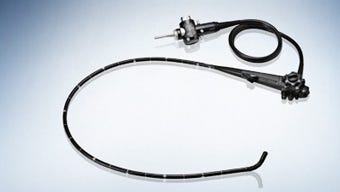March 25, 2015
|
Olympus' TJF-Q180V duodenoscope, as shown on the company's website |
More lawsuits have been filed on behalf of victims of the deadly outbreak at UCLA's Ronald Reagan Medical Center. The local congressman, meanwhile, wants answers.
Chris Newmarker
Olympus Corp. appears to be facing a growing number of lawsuit cases related to its TJF-Q180V duodenoscope, which health authorities have implicated in the spread of the drug-resistant bacterial strain carbapenem-resistant Enterobacteriaceae (CRE).
The LA Times reported last week that lawsuits have been filed in Los Angeles County Superior Court on behalf of at least five people killed or injured in the outbreak.
Plaintiffs include the families of two dead patients, Silvia Patricia Aroche and Antonia Cerda, as well as three other patients who suffered from CRE infections: Leo Palomino, Domingo Gomez, and Aaron Young, according to reports in the LA Times, CBS Los Angeles, and The Guardian.
Olympus seems likely to face more lawsuits related to duodenoscopes. Los Angeles-based Panish Shea & Boyle, which represents most of the plaintiffs in the initial lawsuits, says it thinks hundreds of patients could have been exposed to the highly drug-resistant CRE infection because of the Olympus device. Other law firms are showing interest in the case. The Schmidt Firm of Dallas, for example, is accepting CRE-related injury cases from across the United States.
Meanwhile, U.S. Rep. Ted Lieu, D-CA, whose district includes the UCLA hospital, sent a pointed letter this week to an Olympus vice president of communications and marketing. Lieu pointed out that hospitals across the country are actually having to buy more Olympus duodenoscopes because new Centers for Disease Control surveillance protocols make the devices inaccessible for 24 to 48 hours, and sometimes more. Hospitals are also resorting to alternative cleaning methods, such as gas cleaning. Lieu asks Olympus to donate duodenoscopes, or at least sell them at cost without a profit.
At least seven patients were infected and two died from CRE at UCLA's Ronald Reagan Medical Center from October to January. The hospital believes that 179 patients may have been exposed to CRE from a contaminated, reprocessed Olympus duodenoscope--a type of endoscope threaded down through the digestive tract and into the small intestine. Duodenoscopes are also sold in the United States by manufacturers including Fujifilm and Pentax, and are used in half a million U.S. procedures a year.
Olympus had been selling one of its latest models without FDA 510(k) clearance related to modifications. (FDA, though, says it will allow sales to continue while Olympus seeks clearance.)
Lawsuits claim the Japanese electronics giant redesigned its Olympus TJF-Q180V duodenoscope last year, but provided hospitals and doctors with cleaning instructions for an older model.
"At this time, FDA has no evidence that the lack of a 510(k) clearance was associated with the infections," Olympus previously told Qmed in a statement, and the FDA agreed. The agency will continue to allow sales of the duodenoscopes made by OIympus and competitors Fujifilm Holdings and Pentax, a subsidiary of Ricoh.
FDA has issued a new guidance document for reprocessing reusable medical devices.
"Despite the recent concerns about multi-drug resistant bacteria infections associated with duodenoscopes, patients and health care providers should know that the risk of acquiring an infection from a reprocessed medical device is low" WilliamMaisel, MD, deputy director for science and chief scientist at the FDA's Center for Devices and Radiological Health, said in the latest news release announcing the new guidance.
Some experts wonder whether a plastic sheath could have prevented the duodenoscopes from transmitting the infection, though the complexity of the devices' design could have made such a sheath difficult to create, according to Qmed's sister UBM Canon media site Plastics Today.
Refresh your medical device industry knowledge at BIOMEDevice Boston, May 6-7, 2015. |
Chris Newmarker is senior editor of Qmed and MPMN. Follow him on Twitter at @newmarker.
Like what you're reading? Subscribe to our daily e-newsletter.
About the Author(s)
You May Also Like



